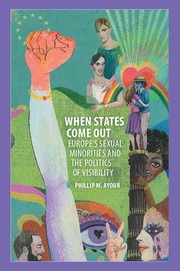 When States Come Out: Europe’s Sexual Minorities and the Politics of Visibility, Phillip M. Ayoub (Cambridge: Cambridge University Press, 2016), 295 pp., $29.99 paper.
When States Come Out: Europe’s Sexual Minorities and the Politics of Visibility, Phillip M. Ayoub (Cambridge: Cambridge University Press, 2016), 295 pp., $29.99 paper.
This timely work is an informative, empirical look at how the norms of visibility and inclusion of LGBT persons have grown and spread throughout Europe. With a keen eye to political history and the subtleties of national and religious identity, Ayoub discusses the causal factors that have led to the variation in the rights and protections for LGBT persons across countries. And his meticulous research sheds valuable light not only on the successes and obstacles of LGBT rights movements but on the course of norm penetration as a whole.
While some of Ayoub’s hypotheses may seem intuitive, the detailed results are richly informative for those interested in human rights, the LGBT rights movement, and norm evolution as a whole. Many of the book’s granular findings pertain to the relationship between a group’s identity and its perception of threats. For example, while increased visibility of LGBT persons tends to correlate with increased acceptance among the casually religious, such increases can lead to backlash among deeply religious or nationalistic groups, at least initially. This aligns with Ayoub’s proposal that religion in and of itself does not prohibit the development of LGBT movements, but rather can impede progress depending on its role in popular nationalism. For some countries in Europe, the church has served as a check against the government, while in others its role has been strongly tied to authoritarianism. In essence, the historic position of the church, and its relationship with liberal values, can have a profound effect on levels of LGBT acceptance within a state.
Likewise, cross-border solidarity can affect the likelihood of LGBT acceptance, depending on the degree to which local populations fear foreign influence. In Poland, for example, a legacy of foreign invasion has caused society to be more skeptical of cross-border LGBT solidarity and wary of norms it sees as being exported from Berlin. Slovenia, on the other hand, has benefited from older ties to transnational rights groups, many of which were formed during the civil rights movement that contributed to the demise of communism in Yugoslavia. To be sure, there is still a resistance to nonheterosexuality in Slovenia, but it is not framed as a defense of national identity as it is in Poland.
More than just a sophisticated case study, When States Come Out is a resource for anyone seeking to promote human rights at the civil society and state levels.
More in this issue
Winter 2017 (31.4) • Essay
Looking Inward Together: Just War Thinking and Our Shared Moral Emotions
In this essay Valerie Morkevicius argues that just war thinking serves a social and psychological role that international law cannot fill. Law is dispassionate and ...
Winter 2017 (31.4) • Review
Justice in Conflict: The Effects of the International Criminal Court’s Interventions on Ending Wars and Building Peace by Mark Kersten
In this book, Mark Kersten convincingly shows that the implications of pursuing “during-conflict justice” are varied and fluid rather than dichotomous and deterministic. The nuanced ...
Winter 2017 (31.4) • Review
Basic Income: A Radical Proposal for a Free Society and a Sane Economy by Philippe van Parijs and Yannick Vanderborght
Basic Income offers by far the most comprehensive and up-to-date discussion of universal basic income (UBI) available today, including a fascinating intellectual history of UBI, ...